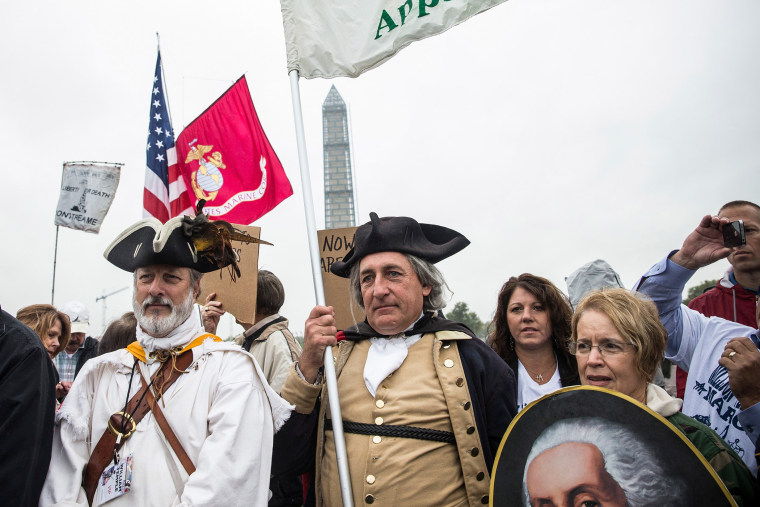When donors contribute to a political action committee, they generally assume the funds will be used to benefit like-minded candidates in competitive campaigns. But as
Matea Gold reported over the weekend, Tea Party PACs are still raising plenty of money, though most of it doesn't reach the candidates themselves.
The Tea Party Patriots Citizens Fund, which blew through nearly $2 million on expenses such as fundraising, polling and consultants in the first three months of this year, is not alone in its meager spending on candidates. A Washington Post analysis found that some of the top national tea party groups engaged in this year's midterm elections have put just a tiny fraction of their money directly into boosting the candidates they've endorsed.
As a matter of rhetoric, Tea Party groups send out urgent appeals, telling contributors that their generosity will help elect conservatives. As a matter of practice, it's a different story -- the Washington Post, relying on data provided by the Sunlight Foundation, found that the six major Tea Party PACs have spent a combined $37.5 million this cycle, but less than $7 million has gone towards direct support for candidates.
In other words, for every dollar a conservative donor sends to one of the major Tea Party PACs, about 18 cents ends up backing like-minded candidates. For some of the groups, it's closer to just 5 cents. And what about the rest of the money? That's a little more complicated, though it appears to go towards paying for salaries, polling, and of course, more fundraising.
Indeed, gone are the days in which the Tea Party "movement" could fairly characterize itself as a rag-tag bunch of grassroots conservatives: "The lavish spending underscores how the protest movement has gone professional, with national groups transforming themselves into multimillion-dollar organizations run by activists collecting six-figure salaries."
There's a reason I love this Chris Hayes
comment from a while back: "Much of movement conservatism is a con and the base are the marks."
Doug Mataconis had
a good piece over the weekend, noting that this phenomenon on the right "isn't entirely new."
Last year, Buzzfeed published a story about Freedomworks that received a lot of attention at the time. Among other things revealed by that reported were such expenditures as $8,000 for a hotel bill for Matt Kibbe, the organization's President and CEO, staff dining at fancy D.C. restaurants, at least $1,000,000 invested in the organization's partnership with Glenn Beck's The Blaze, and a microbrew bar at the organization's headquarters. All of this was paid out of funds donated by the public, but what it had to do with advancing the organization's agenda or supporting the candidates it was backing is entirely unclear. Additionally, Tom Dougherty wrote a detailed post regarding the spending habits of the Senate Conservatives Fund, the PAC founded by Jim DeMint which last year played a prominent role in bringing about the politically disastrous government shutdown. The only conclusion one can reach from Doughterty's analysis of SCF's spending patterns is that the group's mission has nothing to do with advancing Republican candidates.
It's tempting to think that revelations like these would cause real trouble for the groups involved, but I wouldn't count on a sudden donor exodus. For one thing, most conservative contributors probably won't hear about this. For another, many of those who do hear about this may conclude it's a trick of the "liberal media" to discourage support for Republicans.
And finally, note that folks like Newt Gingrich, Mike Huckabee, and Herman Cain attach their names to
sleazy email solicitation programs, which continue to thrive even after being exposed.
